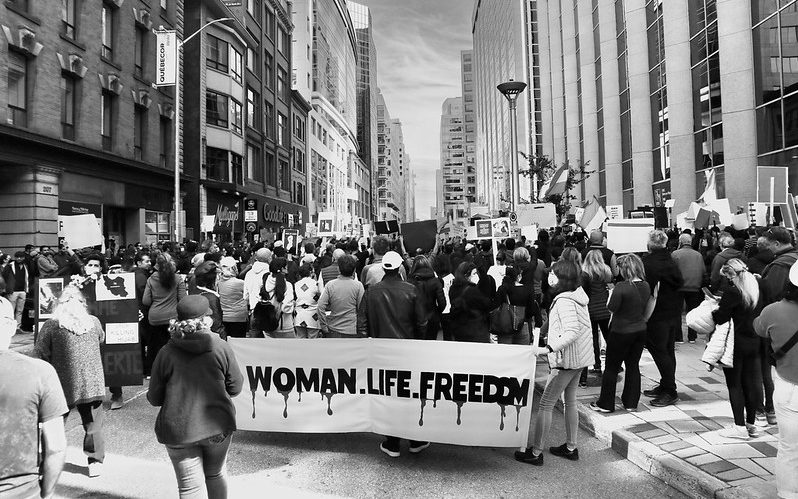There is a moment where you have to choose whether to be silent or stand up. – Malala Yousafzai
For centuries, women have been struggling to attain the rights and privileges men enjoyed since birth. From opening personal bank accounts to voting for and working in the government, women’s rights activism has come down a long progressive way. At present, society seemed to have advanced in elevating the status of women. As we read through the events of 2022, we realize it is anything but. Decades of social and scientific progress from humanity are dismantling as governments globally weaponize their authority to dictate and control the lives of millions of women around the world.
In June 2022, the US Supreme Court, under the ruling of conservative Justices, three of which were nominated by former president Donald Trump during his presidency, overturned the landmark decision of allowing US states to criminalize abortions. Given the cosmic influence of US politics, several countries have attempted to overrule their abortion bills and pillage the right to abortion. Although protests have occurred with multiple prominent politicians joining in, abortion has been criminalized once again in several US states.
Although abortions are important health procedures, their religious notoriety engendered controversy around them. While medical professionals emphasize its necessity, misinformation professionals choose to focus on the procedure as a birth control method, or a ‘baby-killing’ procedure. These discourses might seem innocuous online, but offline, it is a fatal decision which risks the lives of thousands of women in the US alone, particularly minority women who already face the highest maternal mortality rate in developed countries. These rates could escalate exponentially due to a lack of access to abortion for mothers suffering from complicated pregnancies, or those who choose to not have a baby will seek more precarious measures to miscarry. Women could also be killed by their partners or rapists for carrying the baby to term as women are most vulnerable to abuse during pregnancies. The opportunities for women forced to have children will diminish, pushing many women out of the workforce. There are endless grim realities sprouting from the decision made by a few justices in the Supreme Court which will change the lives of women forever.
In Iran, where women are forced to wear headscarves in public, the government utilizes it to suppress women’s interaction with the public and dictate what they wear. Not adhering to these policies can be fatal, and police brutality against women is the norm. Such was the case on September 16th, when a young woman died of brain injury following a heinous assault from the ‘morality police’. The tragic death of a young woman over a mere head covering sparked mass protests led by women in the country. The protests have become violent as women remove their headscarves to show solidarity with the lives lost and cut their hair. The sheer size of the protests has provoked an internet shutdown, a government crackdown on women’s activists, and assault from police forces with reported fatal cases.
On one side of the world, women are assaulted and killed for covering their hair. While Muslim countries coerce their women into ‘modesty’, non-Muslim counterparts commit to the opposite. Several parliamentary sessions across secular democratic countries such as France and India debate on the right to head coverings in public places including schools and government offices.
These incidents are not a coincidence. Governments are opting to focus on deprecating women’s rights while their countries suffer from political turmoil or financial crises. Nearly always, countries choose to attack women to hide or shift public eyes from their own incompetence. Women’s livelihoods are considered dispensable. Their capabilities and importance remain underestimated or underappreciated. Nevertheless, one must stand to preserve them, as our ancestors have. Women’s Rights are Human Rights!
Sources Al Jazeera (2022) French senators vote to ban hijab in sports competitions [online] available from <https://www.aljazeera.com/news/2022/1/19/french-senators-vote-to-ban-the-hijab-in-sports-competitions> Gall, E. (2019) ‘5 Things I’ve Learned from Malala Yousafzai’, Girls’ Globe [online] available from <https://www.girlsglobe.org/2019/07/12/5-things-ive-learned-from-malala-yousafzai/?doing_wp_cron=1664149594.1127951145172119140625> March of Dimes (2022) Abuse During Pregnancy [online] available from <https://www.marchofdimes.org/pregnancy/abuse-during-pregnancy.aspx> Mathew, L. (2022) ‘Opposition Demands Shah Statement on Hijab Row, Walks Out of Lok Sabha’, The Indian Express [online] available from <https://indianexpress.com/article/india/opposition-demands-shah-statement-on-hijab-row-walks-out-of-lok-sabha-7763445/>








Be First to Comment